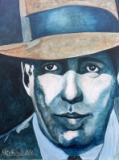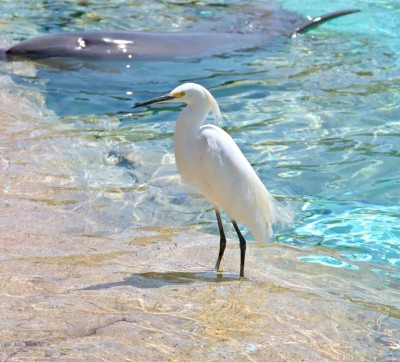The begining - Early Activists
After the Civil War blacks suffered greatly in the South. African Americans became targets for enraged white southerners. Lynchings killed hundreds of blacks every year.

Booker T. Washington was an educator, author, orator, and political leader. He was the dominant figure in the African American community in the United States from 1890 to 1915. Booker T. Washington was part of the last generation of black leaders born in slavery and spoke on behalf of blacks living in the South. Throughout the final 25 years of his life Booker T. Washington was able to maintain his standing as the major black leader because of the sponsorship by powerful whites, substantial support within the black community, his ability to raise educational funds from both groups, and his accommodation to the social realities of the age of Jim Crow segregation.
Booker Taliaferro was born a mulatto slave in Franklin Country on April 5, 1856. His father was an unknown white man and his mother, the slave of James Burroughs, a small farmer in Virginia. Later, his mother married the slave, Washington Ferguson. When Booker entered school he took the name of his stepfather and became known as Booker T. Washington.
After the Civil War the family moved to Malden, West Virginia. His step-father, Walter Ferguson worked in the salt mines and at the age of nine Booker found employment as a salt-packer. A year later he became a coal miner before going to work as a houseboy for the wife of Lewis Ruffner, the owner of the mines. She encouraged Booker to continue his education and in 1872 he entered the Hampton Agricultural Institute.
Booker T. Washington attended Hampton Institute and later Wayland Seminary. While he was a student at Wayland, he became convinced that black students who opted for a classical education forgot their roots and became estranged from the experience of black poverty.
An advocate of change, Booker T. Washington then helped to develop the Tuskegee Institute, recruiting its first students and raising money for its first buildings. As the head of the Tuskegee Institute, Washington encountered strong antipathy from Southern whites who feared that educated blacks would not be willing to enter the agricultural economy that dominated the South. To overcome this, Washington emphasized that the Tuskegee Institute would emphasize “industrial” education, which would provide its students with skill such farming, and carpentry. These, he believed, would be the most likely avenues of employment for the majority of African Americans. Booker T. Washington believed that being productive was the most powerful antidiscrimination tool available.
Washington argued that no race will ever be marginalized if they can contribute to the economy of the world. In 1895 he gave his famous “Atlanta Compromise” speech in which he further argued against “artificial forcing” of rights and emphasized that white society needed African Americans and that any attempt to stifle the growth of blacks by white society would be counterproductive. His compromise was for there to be a symbiotic relationship between the two races.
In 1900, Booker T. Washington founded the National Negro Business League. He strongly believed in self-help and hard work as the keys to success. One of the biggest critics of Washington’s approach was W. E. B. Du Bois, whose ideas were influential in the shaping of modern day black liberalism. His major complaints against Washington were that Washington believed in a subordinate position for African Americans, that Washington denigrated higher education for blacks, and that he was too conciliatory toward the South.
In 1901, President Theodore Roosevelt invited Booker T. Washington to visit him in the White House. To southern whites this was going too far. One editor wrote: "With our long-matured views on the subject of social intercourse between blacks and whites, the least we can say now is that we deplore the President's taste, and we distrust his wisdom."
Washington now spent most of his time on the lecture circuit, and many African Americans became critical of his views. They often objected to the way Washington spoke that it was the role of blacks to serve whites, and that those black leaders who demanded social equality were political extremists. Booker T. Washington's autobiography was published, first in The Outlook magazine and later as Up From Slavery in 1901. His critics argued that the views expressed in his books, articles and lectures were essentially the prevailing views of white Americans.
Most blacks felt comfortable with Washington's approach, however, and his influence among whites was such that he became an unofficial arbiter determining which black individuals and institutions were deemed worthy to benefit from government patronage and white philanthropic support. He went on to receive honorary degrees from Harvard University and Dartmouth College. Booker T. Washington was taken ill and entered St. Luke's Hospital in late 1915. Fearing he did not have long to live, he decided to travel to Tuskegee where he died on 14th November 14, 1915. Over 8,000 people attended his funeral held in the Tuskegee Institute Chapel.
Don't miss a single page. Find everything you need on our complete sitemap directory.
Listen or read the top speeches from African Americans. Read more
Read about the great African Americans who fought in wars. Read more
African Americans invented many of the things we use today. Read more
Thin jazz, think art, think of great actors and find them here. Read more
Follow the history of Black Americans from slave ships to the presidency. Read more
Olympic winners, MVPS of every sport, and people who broke the color barrier. Read more
These men and women risked and sometimes lost their life to fight for the cause. Read more
Meet the people who worked to change the system from the inside. Read more

Visit my RedBubble page and use Michael Arnold Art to create greeting cards, T-shirts, mugs, and more.

The variety and impressive numbers of mammals, birds and marine wildlife in Alaska draw visitors from all over the world. For some travelers, Alaska is wilderness, at least compared to what they may know from back home. The pristine wilderness of Alaska is, perhaps, the last vestige of thriving populations of North American wildlife. Where else can you see polar bears, bald eagles, blue and humpbacked whales, gray wolves, grizzly bears, orcas, lynx, moose, and hundreds of other rare and endangered species in their original and undisturbed natural habitats?

Enjoy our website filled with original signed acrylic paintings by award winning Artist Michael Arnold. Located in Citrus County Florida, Michael Arnold is a the editor at the Citrus County Chronicle. When he's not busy being an editor, he is an avid artist who enjoys painting in a variety of styles. We hope you take the time to click on each image to see a larger view and to learn what the artist, Michael Arnold has to say about his paintings.

As dog owners and people who care deeply for animals and wildlife, we wanted our Dog Encyclopedia to be a website that could empower pet owners to create the most positive, loving environment for their dogs. Dog Encyclopedia realizes that owning a dog is like adding a new member to your family.

Floridian Nature has everything your are looking for in Florida nature. The wildlife of Florida is rich and varied, yet most of us are familiar with only a dozen or so species: the "well known endangered species such as manatees and panthers; those, like raccoons and squirrels, that have adapted to urban environments; the frightening alligators and black bears; and those like the armadillo who can't seem to cross the road. Yet they are just a few of the many animal species found in Florida.
